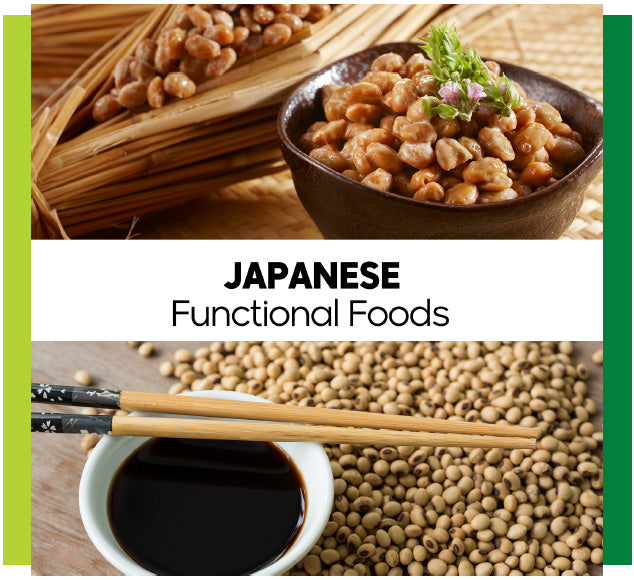Your shopping bag is empty
What are functional foods?

 What are functional foods?
What are functional foods?
Functional foods (FFs) are foods that contain nutritional components that go beyond meeting the basic needs of the body, as they contain active compounds that promote health. The achievement of health benefits of FFs is attributed to their content of essential nutrients such as vitamins, minerals, and dietary fiber, as well as natural plant compounds and other functional chemicals that are present in high concentrations.
Hippocrates was one of the greatest figures in medical history and is considered the founder of preventive medicine. He was dedicated to advancing medicine and improving health through nutrition. He believed in functional nutrition as a dietary philosophy that focuses on natural nutrients and their impact on health and well-being. His phrase "Let food be thy medicine, and let medicine be thy food" encapsulates his vision, as he believed that food is the first medicine and that improving the diet can contribute to disease prevention and enhance the healing process. Hippocrates relied on nature and dietary balance to improve health and maintain well-being.
 Types of functional foods
Types of functional foods
 Conventional functional foods
Conventional functional foods

These are types of foods that contain natural ingredients with additional health benefits in addition to their basic nutritional value. Conventional functional foods are designed to improve the health of consumers and prevent some diseases or support body functions.
These foods are characterized by containing active ingredients, such as fiber, vitamins, minerals, antioxidants, probiotics, and prebiotics, which are considered among a group of factors that are beneficial to human health.
Conventional functional foods are designed in natural ways without the use of chemical additives or genetically modified ingredients, making them a healthy and safe choice for consumption.
 Examples of conventional functional foods
Examples of conventional functional foods
Natural Oils: Natural oils such as olive oil, coconut oil, and flaxseed oil are considered functional foods that provide health benefits beyond basic nutritional value
Honey: Honey is a unique functional food, as it is a natural source of essential nutrients, bee honey contains a wide range of essential vitamins and minerals that support the immune system and contribute to improving body health.
Blueberries: Blueberries are a rich source of antioxidants, vitamin C, and fiber. Research shows that consuming blueberries can contribute to improving brain function and overall health.
Red beetroot: Red beetroot contains the compound beta-carotene, which is an antioxidant that converts to vitamin A in the body. It contributes to supporting eye health and skin, and helps to reduce the risk of heart disease and cancer.
Garlic: Garlic contains compounds such as allicin and selenium that have antioxidant and anti-inflammatory effects and is considered a natural antibiotic. Garlic has many benefits such as strengthening the immune system, improving heart health, and lowering blood pressure.
 Fortified functional foods
Fortified functional foods
These are types of foods that have been processed or improved by adding additional nutritional components such as vitamins, minerals, fiber, amino acids, omega-3 fatty acids, probiotics, and prebiotics. These foods aim to improve the nutritional value of the product and increase the health benefits for the consumer.

 Examples of fortified functional foods
Examples of fortified functional foods
Dietary Supplements: In addition to naturally occurring functional foods, there are also dietary supplements that can provide additional functional components to the body, such as:
- Vitamin D and calcium to strengthen bones and joints.
- Probiotics , which improve digestive health, boost the immune system, and help prevent intestinal diseases.
- Vitamins and minerals that compensate for nutritional deficiencies, support essential body functions, and improve overall health.
- Antioxidants, such as vitamin C , vitamin E , selenium, and curcumin supplements, which fight free radicals, reduce the risk of chronic diseases, and improve skin health.
Milk fortified with calcium and vitamin D: Calcium and vitamin D are added to milk to improve calcium absorption in the body and promote bone health. These fortified functional foods are especially beneficial for people who need to strengthen their bone structures and contribute to the prevention of osteoporosis.
Enriched bread with fiber: Fiber is added to bread to improve its nutritional value and increase dietary fiber in the diet. Fiber helps to improve digestion and satiety for longer periods of time, and reduces the risk of chronic diseases such as heart disease and diabetes.
Yogurt fortified with probiotics: Probiotics are added to yogurt to improve the bacterial balance in the digestive system. These functional foods are known to be beneficial for digestive health and strengthening the immune system.
 Altered functional foods
Altered functional foods
These are types of foods that are modified or changed in composition to be free of certain elements that may cause allergies to some people, or be harmful to people with certain food intolerances.

Milk modified for allergy: Milk is modified to be lactose-free, which is the sugar in milk that causes allergies to some people with milk allergy.
Gluten-free foods: Some foods such as bread, cookies, and pasta are processed to be gluten-free, which is a protein that can be harmful to people with gluten allergy or celiac disease.
 Benefits of Functional Foods
Benefits of Functional Foods
Many of the health benefits of functional foods are due to their direct effects on the body's organs and functions. Some of these benefits include:
1- Improving heart health: Many types of functional foods contain compounds that help lower levels of LDL cholesterol and improve heart function, which can reduce the risk of heart disease.
2- Supporting the immune system: Some functional foods contain antioxidants and vitamins that boost the immune system's activity and protect the body from infection and disease.
3- Improving digestion: Some functional foods promote digestive health by promoting the growth of beneficial bacteria in the gut and improving digestion.
4- Preventing cancer: Some functional foods contain natural chemicals that are thought to be effective in preventing the formation of cancer cells.
5- Supporting brain health: Many types of functional foods contain components that promote brain health and improve cognitive function and memory.
6- Reducing the risk of diabetes: Some functional foods contain compounds that help improve the body's glucose tolerance and blood sugar levels, which can reduce the risk of developing diabetes.
 Functional Foods in Japanese Traditions
Functional Foods in Japanese Traditions

Functional foods have been used traditionally in Japan in cooking and preparation, and are part of Japanese culinary tradition.
 Examples of Japanese functional foods:
Examples of Japanese functional foods:
Soybeans and natto: Soybeans are a good source of plant-based protein, and natto, for example, is a rich source of probiotics, which can help promote digestive health.
Herbs and tea: In Japan, it is common to drink green tea and matcha, and to prepare dishes that contain herbs such as shiitake mushrooms and hakusai leaves (Chinese cabbage). These herbs are a good source of antioxidants, which may help prevent some diseases.
Fish: Fish is an important part of the Japanese diet. Fish contains omega-3 fatty acids, which are beneficial for heart health.
Japan and other countries encourage the consumption of functional foods as part of a healthy lifestyle and balanced diet.
Japan and other countries encourage the consumption of functional foods as part of a healthy lifestyle and balanced diet.
 Conclusion
Conclusion
Functional foods represent a revolutionary concept in the field of healthy nutrition, as they promote health and prevent disease naturally and effectively.
By adopting a diet that includes functional foods, individuals can improve their quality of life and enjoy better health in the long term.
People should avoid relying heavily on processed foods and dietary supplements, and instead be encouraged to follow a balanced diet that includes a variety of natural and functional foods.
Moving away from a diet high in empty calories and saturated fat can significantly improve our health, increase life expectancy, and reduce the risk of chronic diseases. Always remember, "You are what you eat!" and enjoy reaping the full health benefits of functional foods by improving your lifestyle and nutrition.

































